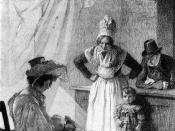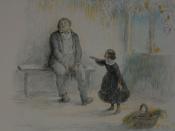In a grand ball at La Vaubyessard, Flaubert's "Madame Bovary" describes Emma's first ever experience with the wealthy. She not only enjoys herself, but she tries to embed this "heavenly" memory within a mind morphed by countless romantic novels. In addition to her great passion for the rich, she also rejects her own class, the bourgeoisie - even rejecting her very husband, who sits patiently for her as the party draws to a close. When we were first introduced to Emma in the novel, Flaubert presents her as an extremely pretty girl, having very white almond shaped fingernails and a skin that possesses a rose color over her cheek bones - which grabbed the attention of Charles Bovary. The reason Flaubert describes Emma with such a positive tone is because the reader sees Emma through the eyes of Charles who later ends up marrying her. After this party, the reader soon realizes that her character/personality morphs; we see the "true" Emma in the narrator's point of view.
This "new" Emma desires to become one of rich by any means necessary. Flaubert described her first "wealthy" party with vivid imagery and by using strong diction; he amplifies how this party represents everything Emma wants - from her own perspective. This party proves as a turning point of her life as her "transformation" of her new self starts to take in shape. Her rejection of her own class, the bourgeoisie, is one of many examples Flaubert uses to satirize the failures of that class and the success of the rich. Using Emma Bovary as his key figure, this party became the first instance of satire on Emma's superficiality of her personality and desires; she absorbs every bit of this party which fuels her longing to become one of the rich...


